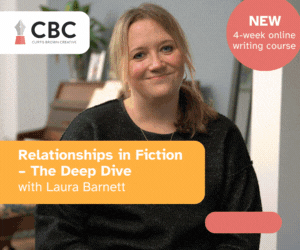Ask An Industry Expert: Bryony Green
21 October 2022
Today I’m delighted to welcome Bryony Green, Executive Editor with Harlequin Mills & Boon, covering Harlequin Presents/Mills & Boon Modern, Harlequin-Romance (which goes into Mills & Boon True Love), Medicals and Historical, and up until recently was Senior Editor for Mills & Boon Historicals (now handed over to Carly Byrne). Bryony was named by author Lissa Morgan for contributing to her success in moving from our New Writers’ Scheme into publication and thus becoming a contender for the Joan Hessayon Award 2022.
 Hello and welcome, Bryony. Can you begin by describing your own journey into the publishing world?
Hello and welcome, Bryony. Can you begin by describing your own journey into the publishing world?
Looking back, there was a whole lot of luck involved! After a degree in media and communication, I decided to apply to any interesting-looking jobs as a first step, and one of them was an Editorial Assistant role at Mills & Boon, which I managed to get! About a year into that job, I started to work on manuscripts and realised how much I enjoyed working with authors over the long term. That was over 25 years ago – but over that time I’ve had umpteen different roles, new challenges, and worked with so many lovely authors and editors!
And what does being an Executive Editor involve?
So the Global Series Acquisitions team acquire 4 Mills & Boon series – Modern, Romance (which goes into True Love in the UK), Medical and Historical, which is a total of 24 titles a month that we publish in two markets, the UK and North America. There are a total of 16 of us working together to acquire and edit those titles. So, although I still have my own authors and edit their manuscripts, a lot of my job is leadership and managerial – I mainly see my role as enabling the team to do their jobs as efficiently as possible, so that includes everything from series strategy, improving processes, pushing for decisions, championing authors and editors. It’s a very varied role and I love it!
I’ve heard it said that an editor should be wary of imposing their own viewpoint on an author’s work. How do you steer that fine line between useful, constructive comment and the temptation to push the story in another direction?
Yes it is very important to embrace and lean into the author’s vision for their story and characters – whilst helping the author to ensure their story delivers on the readers’ expectations. Authors do want to please their readers, so there is usually a way through to do both.
What are the main things an editor brings to the process of fine-tuning a manuscript, that the author might have missed?
So the role of an editor is to help the author make the story as strong as it can be – to make the idea of the story as appealing and saleable to the readership as possible, but at a story level, ensure it pulls the reader in from page 1 and keep them compelled right to the end, as well as deliver on the emotional journeys of their characters and the all-important happy ever after! There are many, many ways to do that – and it works best when the editor flexes around the author to get a process that works for each individual author. For some that might mean a lot of brainstorming together, or it might mean the editor reviewing the m/s in stages or it might mean talking through revisions on the phone. We want to make sure that it is creatively inspiring, respectful, time-efficient and develops two-way trust and open communication.
Could you briefly take us through the basic stages of editing a manuscript, once it’s passed that first hoop of being acquired?
First there are big picture, structural revisions to ensure it’s working well as a romance and delivering to our series expectations, then there may be tweaks to make scenes make sense, or for clarity, consistency or flow. Then it will be accepted for publication – before it is line-edited and copy-edited. The author will then see the AAs (for proof corrections) and finally it is proofread twice by our proofreading team.
A very thorough process! It’s so encouraging that Harlequin is signing new authors like Lissa. Are you seeking fresh submissions at present and can you advise our membership how to go about making one?
We are always looking for new authors – right now we need new authors for Medical, Modern, Historical and Romance, probably in that order of priority! The main submission route is through the Harlequin area of Submittable (Harlequin Submission Manager (submittable.com)). However we also have a number of other initiatives – for example Twitter pitches, competitions and mentorships. Everything is announced on our Write for Harlequin – Finding New Voices in Romantic Fiction so that is a great destination to check out regularly.
Is there a particular type of love story you’d like to receive at the moment? And any no-go areas of things you wouldn’t accept?
At the moment for all our series, we’d love to see more submissions from authors from the LGBTQ+ community (including LGBTQ+ romances for series), submissions from authors of colour, and other marginalised ethnic and religious cultures and from people with disabilities and neurodiversity.
In terms what each series is specifically looking for:
- For Medicals, these themes in particular: babies (twins!), second chance/reunion, single parents, surprise pregnancy, vets and their pets, exciting international medical settings.
- For Modern, feel-good voices (rather than intense and angsty voices), entertaining new ways into classic tropes, strong real-world settings.
- For Historical: Sexy Regency, Victorian, more unusual time periods.
- For Romance: fun and humorous voices, romances with a warm sensuality.
Diversity and inclusion are also high on the agenda for the RNA, as for many other organisations. Could you say a bit more about how you are encouraging this in M&B’s selection of books and authors?
This is a very high priority for us as we want readers of all backgrounds to see themselves reflected in our books. We have made significant strides in this, with a 12% year-on-year increase of titles published from authors of colour – but we still have a long way to go. We have tried a number of new approaches, from attending different conferences, more targeted pitches and mentorships, outreach efforts as well as writer scholarships. It’s a combination of efforts that is working to increase the representation in our series and we’ll keep trying different things.
That’s good to hear. When a new submission lands on your desk (or in your inbox), what makes you sit up and take notice, and does it matter if the author has not precisely ticked all the boxes for the category they are submitting to?
We always want to publish a good story – but if it doesn’t fit any of our series expectations then we may not be able to find a home for it. In our business, authors need to be able to revise to make it fit – be that word length, focus, sensuality level etc – but we will work with authors to help them deliver to the series promise.
M&B’s romance categories have changed over the decades, with some being dropped and new ones introduced. What influences these changes? Are there some categories that are so enduring, they’ll never go?
At a basic level, global sales and profitability influence this but there is a lot of complexity in this because of fragmented global markets and all our multiple channels, from ebook, book chain and subscription sales. Modern/Presents, Romance, Medicals and Historicals have all been going a long time but every series has to work hard to stay relevant, appealing and saleable.
These days, a social media presence is generally deemed essential for authors, but has so many facets, it can be time-consuming to maintain. To what extent does Harlequin expect its authors to market themselves this way and what do you think are the basic essentials?
This is a very tricky one because all authors have different comfort levels with social media. Some of our most successful authors never do any social media, but increasingly that is changing, as developing and engaging with readers on social media is working to sell books. TikTok has proved particularly successful, and many authors have also had success using competitions and Facebook engagement to build mailing lists to message their fans directly. While Twitter can be good for industry discussion, I’m not convinced it’s a strong sales tool for series Romance readers.
What about you as a reader? Can you tell us the last published book you read which you really enjoyed and why?
You know this is a very difficult question for an editor! Because I’ve been acquiring new authors for Historical recently I urge people to check out Parker J. Cole’s debut The Duke’s Defiant Cinderella – the setting in the Court of Louis XVI is just amazing and different! It’s just been released in ebook!
Any thoughts of becoming an author yourself?
No not really, I’m too busy – and I know far too well just how hard it is!
Thank you for sparing time out of your busy schedule to talk with us, Bryony, and keep on supporting those romance writers!
Bryony is contactable on:
Twitter: @BryonyGreenHqn
Email: bryony.green@hqnuk.co.uk
*
Bryony was talking with Susan Leona Fisher (www.SLFisherAuthor.co.uk)




